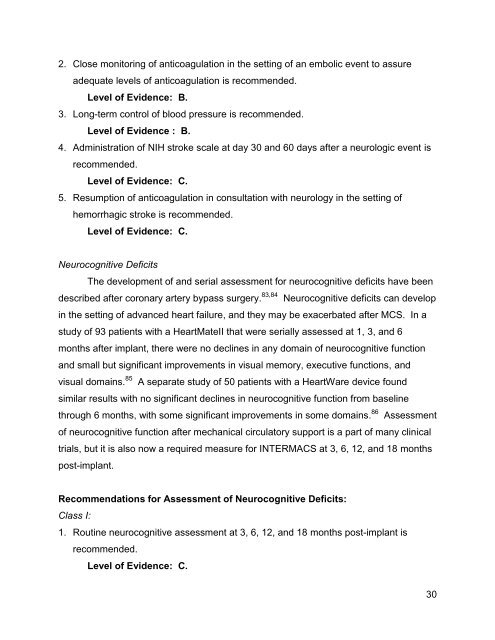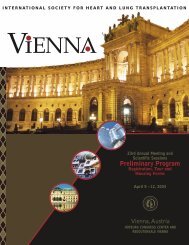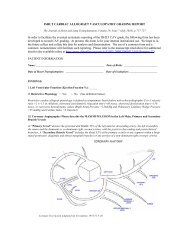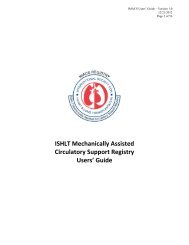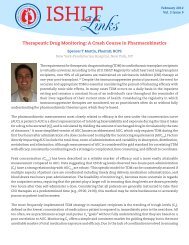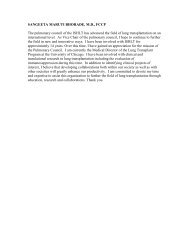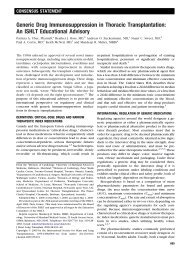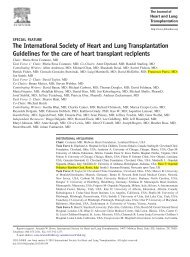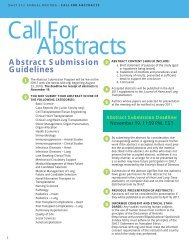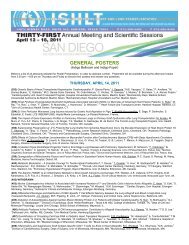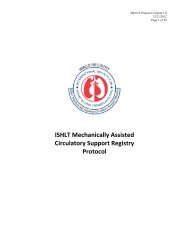Task Force 4: Inpatient Management of Patients with MCSD - The ...
Task Force 4: Inpatient Management of Patients with MCSD - The ...
Task Force 4: Inpatient Management of Patients with MCSD - The ...
You also want an ePaper? Increase the reach of your titles
YUMPU automatically turns print PDFs into web optimized ePapers that Google loves.
2. Close monitoring <strong>of</strong> anticoagulation in the setting <strong>of</strong> an embolic event to assure<br />
adequate levels <strong>of</strong> anticoagulation is recommended.<br />
Level <strong>of</strong> Evidence: B.<br />
3. Long-term control <strong>of</strong> blood pressure is recommended.<br />
Level <strong>of</strong> Evidence : B.<br />
4. Administration <strong>of</strong> NIH stroke scale at day 30 and 60 days after a neurologic event is<br />
recommended.<br />
Level <strong>of</strong> Evidence: C.<br />
5. Resumption <strong>of</strong> anticoagulation in consultation <strong>with</strong> neurology in the setting <strong>of</strong><br />
hemorrhagic stroke is recommended.<br />
Level <strong>of</strong> Evidence: C.<br />
Neurocognitive Deficits<br />
<strong>The</strong> development <strong>of</strong> and serial assessment for neurocognitive deficits have been<br />
described after coronary artery bypass surgery. 83,84 Neurocognitive deficits can develop<br />
in the setting <strong>of</strong> advanced heart failure, and they may be exacerbated after MCS. In a<br />
study <strong>of</strong> 93 patients <strong>with</strong> a HeartMateII that were serially assessed at 1, 3, and 6<br />
months after implant, there were no declines in any domain <strong>of</strong> neurocognitive function<br />
and small but significant improvements in visual memory, executive functions, and<br />
visual domains. 85 A separate study <strong>of</strong> 50 patients <strong>with</strong> a HeartWare device found<br />
similar results <strong>with</strong> no significant declines in neurocognitive function from baseline<br />
through 6 months, <strong>with</strong> some significant improvements in some domains. 86 Assessment<br />
<strong>of</strong> neurocognitive function after mechanical circulatory support is a part <strong>of</strong> many clinical<br />
trials, but it is also now a required measure for INTERMACS at 3, 6, 12, and 18 months<br />
post-implant.<br />
Recommendations for Assessment <strong>of</strong> Neurocognitive Deficits:<br />
Class I:<br />
1. Routine neurocognitive assessment at 3, 6, 12, and 18 months post-implant is<br />
recommended.<br />
Level <strong>of</strong> Evidence: C.<br />
30


